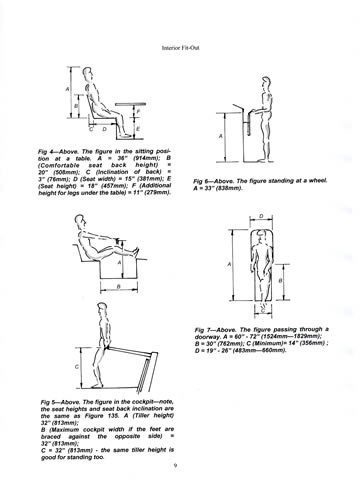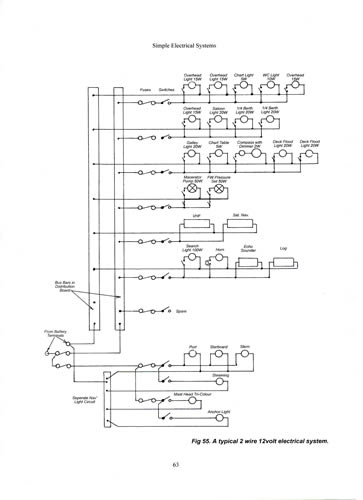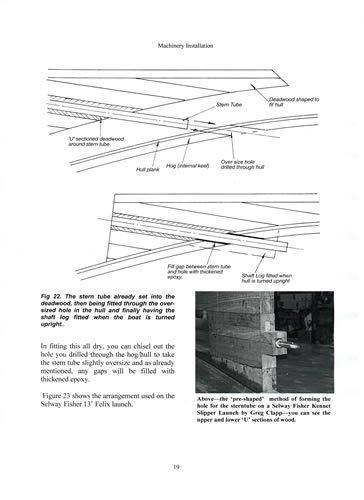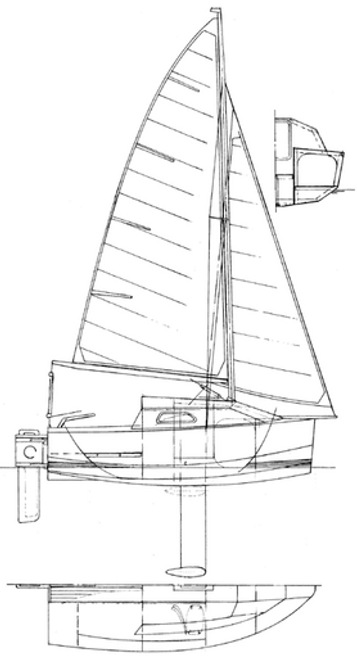Having built the hull, deck and superstructure, you are now ready to think about fitting your boat out. This manual helps you plan for this next and final stage by first, taking a look at the ergonomics (correct seat and table heights etc) of the interior accommodation - to make your boat comfortable. this is followed by details on how to install inboard engines or outboard wells, make inboard and outboard rudders and fit water systems - water ballast, fresh water, bilge plumbing, sewage etc. Gas, cabin ventilation, electric systems are looked at next, along with electrolysis and lightning protection.
Finally, the manual finishes with chapters on making wood masts and spars, fitting deck gear and rigging and the sort of ground tackle you may want to carry.
Sample Pages



Contents
Chapter 1
Interior Fit-Out
1.1 The Ergonomics of the Interior Space
1.2 Typical Fit-Out Joinery
Chapter 2
Machinery Installation
2.1 Inboard Engine Installation
2.1.1 The Line of the Shaft
2.1.2 The Traditional Way of Forming the Shaft Line
2.1.3 The Modern Way of Forming the Shaft Line
2.2 Outboard Wells
2.3 Fuel Tanks for Inboard Engines
Chapter 3
Keels
3.1 General
3.2 The Deadwood/Wood Keel
3.3 Ballast Keel
3.4 Internal Ballast
3.5 Centreplates
3.6 Bilge Keels
Chapter 4
Rudders
4.1 General Discussion
4.2 Outboard (Transom) Hung Rudders
4.3 Inboard Hung Rudders
4.4 Rudder Fittings
4.4.1 For External (Outboard) Rudders
4.4.2 For Inboard Rudders
Chapter 5
Water Ballast Tanks
5.1 General Discussion
5.2 Tank Construction & Fit-Out
Chapter 6
Water Systems
6.1 General Discussion
6.2 The Fresh water System
6.3 the WC/Sewage System
6.4 The Bilge Pumping System
6.5 Cockpit Drains
Chapter 7
The Gas System & Cabin Ventilation
7.1 General requirements
7.2 Gas Bottle (Cylinder) Stowage
7.3 Pipework and Connections
7.4 Cabin Ventilation
Chapter 8
Simple Electrical Systems
8.1 General Notes
8.2 Electrical Circuits
8.2.1 Cable Sizes
8.2.2 Fuses
8.3 Overall Electrical System
Chapter 9
Electrolysis
9.1 General Notes
9.2 Current Leakage
9.3 Sacrificial Anodes
Chapter 10
Lightning Protection
Chapter 11
Masts & Spars
11.1 General Notes
11.2 Materials for Wood Masts and Spars
11.3 Solid Masts and Spars
11.4 Hollow Masts and Spars
11.4.1 Round Section Hollow Masts and Spars
11.4.2 Rectangular Section Hollow masts and Spars
Chapter 12
Fitting the Deck gear for Rigging etc
12.1 General Notes
12.2 Chain Plates
12.3 Deck Cleats
12.4 Deck Winches
12.5 Positioning Jib Fairleads
12.5.1 How the Designer May
Position the Foresail Sheet Fairleads
12.5.2 Correcting a Badly Placed Foresail Fairlead
12.5.3 A Note on Correcting the Balance of a Sail Boat
Chapter 13
Appendices & References
13.1 Glossary of Terms
13.2 Expanding a Curved Transom
13.3 Further Deck Gear
13.3.1 Boom Gallows
13.3.2 Mainsheet Horse
13.3.3 Raising the Coachhouse Top
13.4 Ground Tackle
13.5 Useful References for Further Reading







